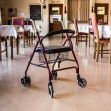A nursing home in Pinellas County, Florida, was sued earlier this year over claims of negligence that resulted in the wrongful death of Loretta McMaster. Peter McMaster, the personal representative of her estate and her son, filed the lawsuit against Manor Care of Dunedin Florida, HCR III Healthcare, LLC, and ProMedica Health System, Inc.
McMaster is claiming that his mother wrongfully died as a direct result of the actions of the nursing home while she was under their care. The complaint alleges that the plaintiff suffered multiple falls and was “plagued with injuries” until she passed on July 2, 2020. He further claims that the nursing home system “committed tortious acts” against the plaintiff and that the care facility “failed to provide the required reasonable care, supervision, and assistance.”
Under Florida law, a wrongful death case can be filed when “a person or entity causes another person’s death by a ‘wrongful act, negligence, default, or breach of contract or warranty.” Unlike other states, Florida requires more than just a relative to sue on behalf of the deceased person. The only individual eligible to file a lawsuit based on wrongful death is the personal representative of the deceased person’s estate. The statute of limitations is two years from the date of death of the victim but can be extended for an additional two years if it is found that there was a “fraudulent concealment or intentional misrepresentation of fact.”
According to Florida Statutes section 400.0233, lawyers must first conduct statutory pre-suit investigative and notice processes before filing a lawsuit against a nursing home for wrongful death incidents. The claimant must notify each prospective defendant by certified mail outlining the violation of the rights and the alleged actions to have caused the injury or death of the victim. This notice must also contain a certification that a “reasonable investigation gave rise to a good faith belief that grounds exist for an action against each prospective defendant. “
The plaintiff then must wait 75 days after the notice is mailed to the prospective defendant, allowing for the defendants to conduct their evaluations of the claims. At the end of this period, when the required assessments are complete, the defendant must provide a written response to the initial notice in the form of either a rejection of the claim or a settlement offer.
Unlike a wrongful death claim, a survival action claim must be filed before the death of the victim, meaning another individual or estate filed a lawsuit on the same negligence or medical malpractice. The damages paid for a survival action complaint go directly to the estate, automatically.
Two categories of damages can be awarded in a wrongful death case in Florida: damages paid to the family or damages paid to the estate. When they are paid to the family they can be compensated for mental pain and suffering, loss of parental companionship, medical and funeral expenses, and the loss of support that was provided by the deceased person. In contrast, when damages are paid to the estate they are paid for lost wages and benefits or medical and funeral expenses.
ProMedica Health Systems is a “not-for-profit organization” that provides senior care services in 26 states across the country, but that is only one part of their medical portfolio of care. In 2021, the company reported over $101 million in losses in large part because of its Senior Care division and the slowing relief collected from the CARES Act stimulus funds.






